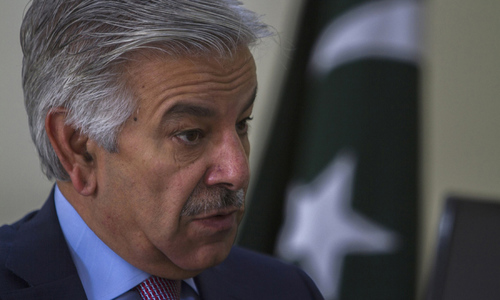US aware of Afghan Taliban's presence in Peshawar and Quetta: Gen John Nicholson
Gen John W. Nicholson, the top United States commander in Afghanistan, claimed on Saturday that the US was aware of Afghan Taliban leadership's presence in Peshawar and Quetta, adding that the military would continue to put pressure on Taliban sanctuaries inside and outside Afghanistan.
In an exclusive interview with Tolo News, the top commander discussed US President Donald Trump's recent speech in which he revealed his long-awaited policy on the Afghan war.
Trump, in his first address as the commander-in-chief, called for greater troop deployment and Indian involvement in Afghanistan while lambasting Pakistan for offering safe havens to “agents of chaos”.
According to Gen Nicolson, the matter of the alleged sanctuaries for terrorists was being addressed "in private" by the governments of US and Pakistan.
“The Quetta shura, Peshawar shura — these shuras are identified by cities inside Pakistan; we know Afghan Taliban leaders are in these areas,” said Gen Nicholson in the interview. “Support for terrorists and insurgents has to be reduced — [it] has to be stopped.”
The top commander said that Washington's new policy in the region was not time-based; rather, it relied on the fulfillment of certain conditions.
“It is our mandate to put military pressure on the Taliban," Gen Nicholson said, adding that Washington was seeking a peaceful solution in Afghanistan. “Taliban need to know they cannot win militarily."
Hoping that the Taliban would enter the peace process with Washington, the top commander said that the military would continue to put pressure on their sanctuaries inside and outside Afghanistan.
The top commander said that while it was possible to find a diplomatic formula in Afghanistan, the US would continue its military efforts in the country and help Afghan forces improve their capabilities.
By increasing their territorial control and continuing to put pressure on the 'safe havens', Gen Nicholson was hopeful that the Taliban would be forced to enter a peace process.
Following Trump's speech last Monday, relations between Islamabad and Washington have become tense.
A day after Trump accused Pakistan of duplicity, Secretary of State Rex Tillerson had warned Pakistan that it could lose its status as a privileged military ally if it continues giving 'safe haven' to Afghan militant groups.
Tillerson had claimed that Washington has "leverage" over Pakistan, "a non-Nato ally" that has been receiving US aid.
US Ambassador David Hale held separate meetings with Foreign Minister Khawaja Asif and Chief of Army Staff Gen Qamar Javed Bajwa to brief them on the new policy.
"We are not looking for any material or financial assistance from the US, but trust, understanding and [an] acknowledgement of our contributions," the COAS had told Hale.
A day after the policy was unveiled, the Foreign Office had rejected the allegations made against Pakistan.













































